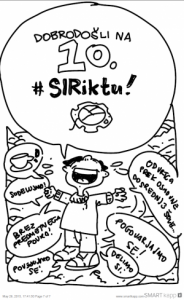Maja Vreča, Arnes, Ljubljana
As a form of education, in recent years MOOCs have positively flourished around the world, especially at major world universities. The majority of these courses have been set up on specialised platforms such as Coursera, Udacity and edX. And since Moodle classrooms are very popular in the Slovenian setting, we have used them as the platform for our MOOCs. The free ARNES ‘MOOC-V’ open online course is based on the European competence model DIGCOMP, which sets guidelines for how to become a competent ‘e-citizen’ and covers the entire area of digital safety. It lasts three weeks, and once it is concluded the participants also meet in one of the concluding off-line workshops, where they solve cases of safety issues that have arisen in our schools. The aim of the course is to spread knowledge about safe use of the internet, with an emphasis on educators. The basic content is set out in short video clips, and participants solve quizzes and take part in forums, while there is a selection of additional content and links available, and even a thematic ‘entertainment corner’. We have also put together study materials and sample lessons for teachers, to help them work with students. A small pilot group helped us a lot in making the first MOOC-V much better than the pilot version, but no version of a MOOC-V is the same as a previous one, since the content is being continually upgraded. We regularly solicit the cooperation of external experts, both in preparing content and in responding on forums. We also regularly add new functionalities and redesign existing ones. Between 2014 and 2016 we carried out one pilot and four mass versions, which saw the participation of more than 3,000 people in total. More than 65% of participants performed all the online activities (in the major world MOOCs this figure usually hovers between 5 and 10%), while 55% of participants joined one of the meetings in person. The structure of the participants is highly diverse, but teachers and students predominate. All three Slovenian faculties of education are involved, and at some, MOOC-V is a part of the study requirements. Participants are mainly from Slovenia, but despite the language barrier there are also some from neighbouring countries – Croatia, Bosnia-Herzegovina, Serbia and Macedonia – and even from Argentina. Within the course we are building a community where participants exchange experiences, and the providers also learn a lot from participants. This year we also set up an additional forum where participants can exchange experiences throughout the year.
